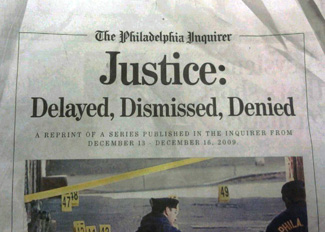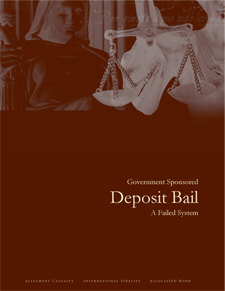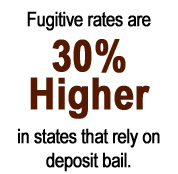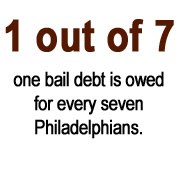 Photograph of The Philadelphia Inquirer |
“The bail system is a complete cartoon,” says Deputy District Attorney John P. Delaney Jr., one of Philadelphia’s top prosecutors.(1) Delaney is referring to the city’s deposit bail system, which means defendants post 10 percent of their bail amount to the court in cash. If the defendant fails to appear, the court keeps all of the deposit and the remaining 90 percent is then owed to the court by the defendant.
Herein lies the problem: more often than not, the courts do not have the resources to actually collect that remaining balance. As Temple University criminal justice professor John Goldkamp explains, this sends a harmful message. “It says, ‘Don’t sweat it. You can go home and you don’t have to come back.’”(1) Naturally, without any real consequence in place, accused criminals regularly skip their court date. Philadelphia court data from 2007 and 2008 showed that 19,000 defendants annually fail to show up in court for at least one hearing. In other words, one of every three defendants becomes a fugitive due to insufficient deposit bail.
 |
Moreover, these uncollected deposit bail debts now add up to a whopping $1 billion. That sum is owed by about 210,000 defendants—one bail debt for every seven Philadelphians.(1) For decades, no one has gotten serious about collecting this money. In interviews, city officials have blamed one another for the steady accumulation of massive bail debt.(1) Somewhere along the way, the names of these debtors got lost.
Places that ban commercial bail “pay a high price,” economics professors Eric Helland and Alexander Tabarrok wrote in a 2004 study. After analyzing eight years of national data, they concluded that fugitive rates were 30 percent higher in states that relied on deposit bail. These places become criminal cesspools, like Philadelphia is today. Jerry Watson, Chief Legal Officer for AIA. explains, “If I’m a career criminal, I would move tomorrow to Philadelphia. Because I love it— if I get arrested, I will get out of jail for 10 percent, max. I know that I will not pay any more than that and that nobody is going to come after me.”(1)
If surety bail was reintroduced to Philadelphia, defendants would finally be held accountable for their court appearances. As experts from universities and the U.S. Department of Justice have found, clients of commercial bail bond agencies are more likely to appear for court in the first place and more likely to be captured if they flee.(1) For more information about the failure of deposit bail across the United States, visit www.depositbailtruth.com to request a copy of AIA’s booklet, “Government Sponsored Deposit Bail: A Failed System.”
(1) Dylan Purcell, Craig R. McCoy, and Nancy Phillips, “Violent Criminals Flout Broken Bail System.” The Philadelphia Inquirer, December 13-16 2009, Part III of “Justice: Delayed Dismissed, Denied.”
Part 1: Deposit Bail Has Failed Philadelphia
Part 2: Criminals Defy Broken 10% Deposit Bail System
Part 3: Witness Intimidation Causes Cases to Collapse
Part 4: Defense Lawyers Exploit the Court System



